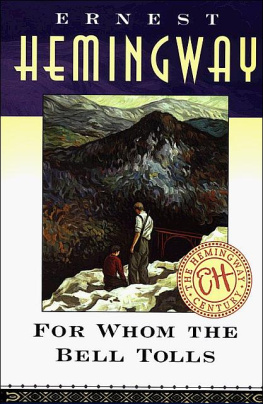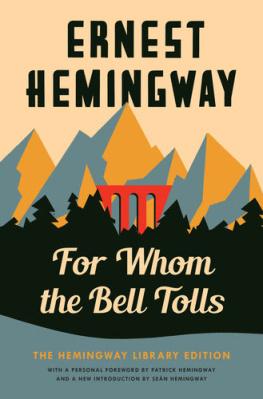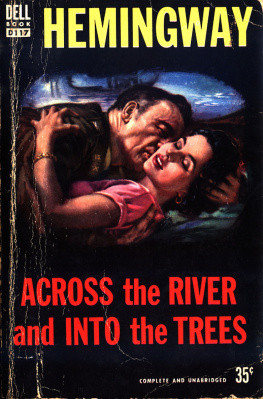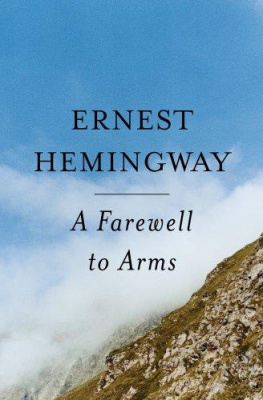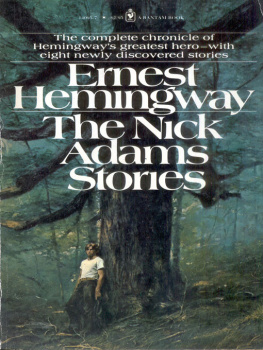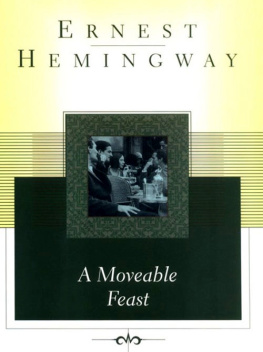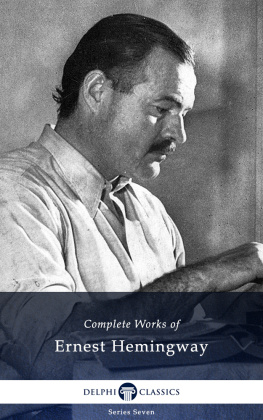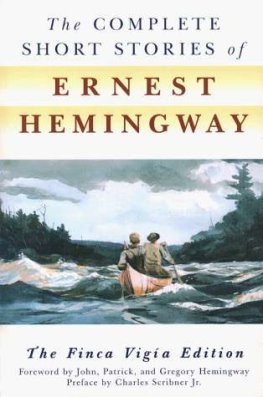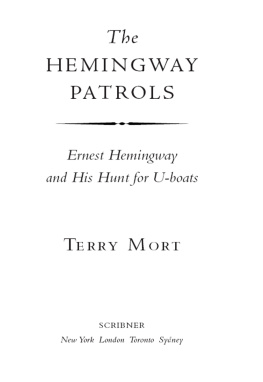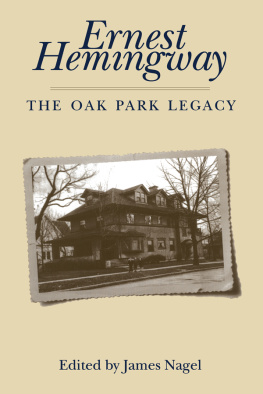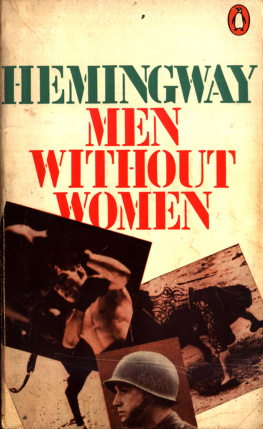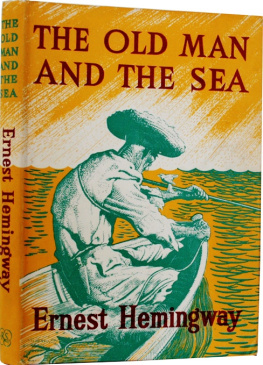Ernest Hemingway - For Whom the Bell Tolls
Here you can read online Ernest Hemingway - For Whom the Bell Tolls full text of the book (entire story) in english for free. Download pdf and epub, get meaning, cover and reviews about this ebook. year: 1968, publisher: Scribner, genre: Art. Description of the work, (preface) as well as reviews are available. Best literature library LitArk.com created for fans of good reading and offers a wide selection of genres:
Romance novel
Science fiction
Adventure
Detective
Science
History
Home and family
Prose
Art
Politics
Computer
Non-fiction
Religion
Business
Children
Humor
Choose a favorite category and find really read worthwhile books. Enjoy immersion in the world of imagination, feel the emotions of the characters or learn something new for yourself, make an fascinating discovery.
- Book:For Whom the Bell Tolls
- Author:
- Publisher:Scribner
- Genre:
- Year:1968
- Rating:4 / 5
- Favourites:Add to favourites
- Your mark:
- 80
- 1
- 2
- 3
- 4
- 5
For Whom the Bell Tolls: summary, description and annotation
We offer to read an annotation, description, summary or preface (depends on what the author of the book "For Whom the Bell Tolls" wrote himself). If you haven't found the necessary information about the book — write in the comments, we will try to find it.
For Whom the Bell Tolls — read online for free the complete book (whole text) full work
Below is the text of the book, divided by pages. System saving the place of the last page read, allows you to conveniently read the book "For Whom the Bell Tolls" online for free, without having to search again every time where you left off. Put a bookmark, and you can go to the page where you finished reading at any time.
Font size:
Interval:
Bookmark:
Ernest Hemingway
Thisbook is for
MARTHAGELLHORN
No man is an Iland, intire ofit selfe; every man is a peece of the Continent, a part of the maine;if a Clod bee washed away by the Sea, Europe is the lesse,as well as if a Promontorie were, as well as if a Mannor of thy friendsor of thine owne were; any mans death diminishes me, because I aminvolved in Mankinde; And therefore never send to know for whom the belltolls; It tolls for thee.
JOHNDONNE
He lay flat on the brown,pine-needled floor of the forest, his chin on his folded arms, and highoverhead the wind blew in the tops of the pine trees. The mountainside slopedgently where he lay; but below it was steep and he could see the dark of the oiledroad winding through the pass. There was a stream alongside the road and fardown the pass he saw a mill beside the stream and the falling water of the dam,white in the summer sunlight.
Is that the mill? he asked.
Yes.
I do not remember it.
It was built since you were here.The old mill is farther down; much below the pass.
He spread the photostated militarymap out on the forest floor and looked at it carefully. The old man looked overhis shoulder. He was a short and solid old man in a black peasants smock andgray iron-stiff trousers and he wore rope-soled shoes. He was breathing heavilyfrom the climb and his hand rested on one of the two heavy packs they had beencarrying.
Then you cannot see the bridge fromhere.
No, the old man said. This is theeasy country of the pass where the stream flows gently. Below, where the roadturns out of sight in the trees, it drops suddenly and there is a steep gorge
I remember.
Across this gorge is the bridge.
And where are their posts?
There is a post at the mill thatyou see there.
The young man, who was studying thecountry, took his glasses from the pocket of his faded, khaki flannel shirt,wiped the lenses with a handkerchief, screwed the eyepieces around until theboards of the mill showed suddenly clearly and he saw the wooden bench besidethe door; the huge pile of sawdust that rose behind the open shed where thecircular saw was, and a stretch of the flume that brought the logs down fromthe mountainside on the other bank of the stream. The stream showed clear andsmooth-looking in the glasses and, below the curl of the falling water, thespray from the dam was blowing in the wind.
There is no sentry.
There is smoke coming from themillhouse, the old man said. There are also clothes hanging on a line.
I see them but I do not see anysentry.
Perhaps he is in the shade, theold man explained. It is hot there now. He would be in the shadow at the endwe do not see.
Probably. Where is the next post?
Below the bridge. It is at theroadmenders hut at kilometer five from the top of the pass.
How many men are here? He pointedat the mill.
Perhaps four and a corporal.
And below?
More. I will find out.
And at the bridge?
Always two. One at each end.
We will need a certain number ofmen, he said. How many men can you get?
I can bring as many men as youwish, the old man said. There are many men now here in the hills.
How many?
There are more than a hundred. Butthey are in small bands. How many men will you need?
I will let you know when we havestudied the bridge.
Do you wish to study it now?
No. Now I wish to go to where wewill hide this explosive until it is time. I would like to have it hidden inutmost security at a distance no greater than half an hour from the bridge, ifthat is possible.
That is simple, the old man said.From where we are going, it will all be downhill to the bridge. But now wemust climb a little in seriousness to get there. Are you hungry?
Yes, the young man said. But wewill eat later. How are you called? I have forgotten. It was a bad sign to himthat he had forgotten.
Anselmo, the old man said. I amcalled Anselmo and I come from Barco de Avila. Let me help you with that pack.
The young man, who was tall andthin, with sun-streaked fair hair, and a wind- and sun-burned face, who worethe sun-faded flannel shirt, a pair of peasants trousers and rope-soled shoes,leaned over, put his arm through one of the leather pack straps and swung theheavy pack up onto his shoulders. He worked his arm through the other strap andsettled the weight of the pack against his back. His shirt was still wet fromwhere the pack had rested.
I have it up now, he said. How dowe go?
We climb, Anselmo said.
Bending under the weight of thepacks, sweating, they climbed steadily in the pine forest that covered themountainside. There was no trail that the young man could see, but they wereworking up and around the face of the mountain and now they crossed a smallstream and the old man went steadily on ahead up the edge of the rocky streambed. The climbing now was steeper and more difficult, until finally the streamseemed to drop down over the edge of a smooth granite ledge that rose above themand the old man waited at the foot of the ledge for the young man to come up tohim.
How are you making it?
All right, the young man said. Hewas sweating heavily and his thigh muscles were twitchy from the steepness ofthe climb.
Wait here now for me. I go ahead towarn them. You do not want to be shot at carrying that stuff.
Not even in a joke, the young mansaid. Is it far?
It is very close. How do they callthee?
Roberto, the young man answered.He had slipped the pack off and lowered it gently down between two boulders bythe stream bed.
Wait here, then, Roberto, and Iwill return for you.
Good, the young man said. But doyou plan to go down this way to the bridge?
No. When we go to the bridge itwill be by another way. Shorter and easier.
I do not want this material to bestored too far from the bridge.
You will see. If you are notsatisfied, we will take another place.
We will see, the young man said.
He sat by the packs and watched theold man climb the ledge. It was not hard to climb and from the way he foundhand-holds without searching for them the young man could see that he hadclimbed it many times before. Yet whoever was above had been very careful notto leave any trail.
The young man, whose name was RobertJordan, was extremely hungry and he was worried. He was often hungry but he wasnot usually worried because he did not give any importance to what happened tohimself and he knew from experience how simple it was to move behind the enemylines in all this country. It was as simple to move behind them as it was tocross through them, if you had a good guide. It was only giving importance towhat happened to you if you were caught that made it difficult; that anddeciding whom to trust. You had to trust the people you worked with completelyor not at all, and you had to make decisions about the trusting. He was notworried about any of that. But there were other things.
This Anselmo had been a good guideand he could travel wonderfully in the mountains. Robert Jordan could walk wellenough himself and he knew from following him since before daylight that theold man could walk him to death. Robert Jordan trusted the man, Anselmo, sofar, in everything except judgment. He had not yet had an opportunity to testhis judgment, and, anyway, the judgment was his own responsibility. No, he didnot worry about Anselmo and the problem of the bridge was no more difficultthan many other problems. He knew how to blow any sort of bridge that you couldname and he had blown them of all sizes and constructions. There was enoughexplosive and all equipment in the two packs to blow this bridge properly evenif it were twice as big as Anselmo reported it, as he remembered it when he hadwalked over it on his way to La Granja on a walking trip in 1933, and as Golzhad read him the description of it night before last in that upstairs room inthe house outside of the Escorial.
Font size:
Interval:
Bookmark:
Similar books «For Whom the Bell Tolls»
Look at similar books to For Whom the Bell Tolls. We have selected literature similar in name and meaning in the hope of providing readers with more options to find new, interesting, not yet read works.
Discussion, reviews of the book For Whom the Bell Tolls and just readers' own opinions. Leave your comments, write what you think about the work, its meaning or the main characters. Specify what exactly you liked and what you didn't like, and why you think so.

